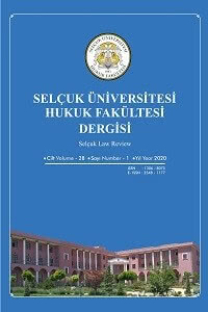Doçentlik sınavı ve doçantlik kadrosuna atanma
Associate professorship and promotion to associate professorship
___
- BOOKS, ARTICLES AND REPORTS Amerasinghe C.F, Local Remedies in International Law, (Grotius Publications Limited, Cambridge, 1990)
- Bermann G.A, Taking Subsidiarity Seriously: Federalism in the European Community and the United States, in 94 Columbia Law Review, 332 (March 1994 )
- Breton A, Cassano A, Fraschini A, Decentralization and Subsidiarity: Towardz a Theoretical Reconciliation, in 19 University of Pennsylvania Journal of International Economic Law 21, (Spring,1998)
- Brownlie I, Basic Documents on Human Rights 3rd edition, (Oxford University Press, 1999) Cameron I, An introduction to the European Convention on Human Rights, (Iustug Forlag, Upsala, 1998),
- Clements L, Mole N, Simmons A, European Human Rights: Taking A Case Under The Convention, Second Edition (Sweet & Maxwell, London , 1999)
- Drzemczewski A, European Human Rights Convention in Domestic Law: A Comparative Study, 1983 Eide A, Alfredsson G, The Universal Declaration of Human Rights: A commentary, (Scandinavian University Press, Oslo, 1992)
- Encyclopaedia of Public International Law, Volume 3 (Oxford et.al, 1997)
- Frowein J.A, Incorporation of the Convention into Domestic Law, in Gardner J.P (ed.), Aspects of Incorporation of the European Convention on Human Rights into Domestic Law, (The British Institute of International and Comparative Law, 1993)
- Gomien D, Harris, D, Zwaak L, Law and Practice of the European Convention on Human Rights and the European Social Charter, Council of Europe Publishing
- Hampson J.F, The Concept of Arguable Claim under Article 13 of the European Convention on Human Rights, in International and Comparative Law Quarterly, 39(1990) 891
- Harris D.J, O‟Boyle M, Warbrick C, Law of the European Convention on Human Rights, (Butterworths, London-Dublin-Edinburgh, 1995)
- Hueglin T, Federalism, Subsidiarity and the European Union Tradition, article available at http://www.ecsanet.org/conference/1to.htm visited on 10.07.2001
- Jacobs F.G, The European Convention on Human Rights, (Clarendon Press, Oxford, 1975)
- Janis M, Kay R, Bradley A, European Human Rights Law Text and Materials, (Oxford University Press, 2000)
- Kirchner C, The Principle of Subsidiarity in the Treaty on European Union: A Critique from a Perspective of Constitutional Economics, in Tulane Journal of International and Comparative Law 291 (Spring 1998)
- Lawson F.H, Remedies of English Law, (Butterworths, London, 1980)
- Lenaerts K, The Principle of Subsidiarity and the Environment in the European Union: Keeping the Balance of Federalism, in 17 Fordham International Law Journal 846
- Nedjati Z.M, Human Rights under the European Convention, (North Holland Publishing, Amsterdam,New York, Oxford, 1978)
- Mann K, Punitive Civil Sanctions: The Middleground Between Criminal and Civil Law, in Yale Law Journal(101)
- Merrills J.G, The Development of International Law by the European Court of Human Rights (Manchaster University Press)
- Murphy D.T, Subsidiarity and/or Human Rights, in1994 University of Richmond Law Review Association University of Richmond Law Review 67 (Winter 1994)
- P.van Dijk, G.J.H. Van Hoof, Theory and Practice of the European Convention on Human Rights, (Kluwer Law and Taxation Publishers, Deventer-Boston, 1990)
- Petzold H, The Convention and the Principle of Subsidiarity, in Macdonald R. St. J at all (eds) the European System for the Protection of Human Rights (Martinus Nijhoff Publishers, Dordrecht-Boston-london) 41
- Raymond J, A contribution to the interpretation of the Article 13 of the European Convention on Human Rights, in V HRR (1980)
- Reid K, A Practitioner Guide to the European Convention of Human Rights, (Sweet & Maxwell, London, 1998)
- Reidy A, Hampson F, Boyle K, Gross Violations of Human Rights: Invoking the European Convention on Human Rights in the case of Turkey, in Netherlands Quarterly of Human Rights Volume 15 No. 2 June 1997
- Schwartz, R.E, Chaos, Oppression, and Rebellion: the Use of Self-Help to Secure Individual Rights Under International Law, in 12 Boston University International Law Journal 255
- Shelton D, Remedies in International Human Rights Law, (Oxford University Press, 1999)
- Shelton D, Subsidiarity, Democracy and Human Rights, in Gomien D (ed), Broadening the Frontiers of Human Rights; Essays in Honour of Asjborn Eide, (Scandinavian University Press, Oslo, 1993)
- Shilling T, Subsidiartiy as a Rule and Principle, or: Taking Subsidiarity Seriously,availablehttp://www.jeanmonnetprogram.org/papers/95/9510ind.html#top_of_page visited on 02.09.2001
- Swaine E.T, Subsidiarity and Self-Interest: Federalism at the European Court of Justice, in 41 Harvard International Law Journal 1 (Winter, 2000)
- Theo van Boven, Study Concerning the Right to Restitution, Compensation and Rehabilitation For Victims of Gross Violations of Human Rights and Fundamental Freedoms, E/CN.4/SUB.2/1993/8
- Thune G.H, The Right to an Effective Remedy in Domestic Law: Article 13 of the European Convention on Human Rights, in Gomien D (ed.) Broadening the Frontiers of Human Rights; Essays in Honour of Asjborn Eide (Scandinavian University Press, Oslo, 1993)
- Trindade C, The Application of the Rule of Exhaustion of Local Remedies in International Law, (Cambridge University Press, 1983)
- Vause W.G, The Subsidiarity Principle in European Union Law -American Federalism Compared, in 27 Case Western Reserve Journal of International Law 61
- Yourow H.C, The Margin of Appreciation Doctrine in the Dynamics of European Human Rights Jurisprudence, (Martinus Nijhoff Publishers)
- Warbrick C, “Federal” Aspects of the European Convention on Human Rights, in Michigan Journal of International Law (1989) 698
- Wolcher, L.E, The Paradox of Remedies:The case of International Human Rights Law, in 38 Columbia Journal of Transnational law, 515.
- ISSN: 1306-8075
- Yayın Aralığı: 4
- Başlangıç: 1988
- Yayıncı: Selçuk Üniversitesi
The Subsidiary Protection of European Convention on Human Rights
Ceza Muhakemesi Hukukunda İfade Alma ve Sorgu
Paylı Mülkiyet Hissesinin Haczi ve Satışı
Doçentlik sınavı ve doçantlik kadrosuna atanma
Culpa in Contrahendo Sorumluluğu
Türk ve Alman Hukukunda Gerekçe Yükümlülüğü
